Kenya
Police in Kenya say they have been ordered not to report deaths amid demonstrations against the rising cost of living, but an independent watchdog says at least six people were shot dead by police on Wednesday and 27 were shot dead in such protests earlier this year.
A police official told The Associated Press they were told this week not to report any deaths in the demonstrations that the political opposition has called through Friday. It wasn't immediately clear who issued the order. The official spoke on condition of anonymity because they weren't authorized to speak publicly. Police in the previous demonstration last week confirmed officers killed at least six.
While police in Kenya have long been accused by rights groups of using excessive force, there is growing concern about tactics used under the government of President William Ruto, elected last year. One police officer also was seen posing as a journalist in Wednesday's protest, which the Media Council of Kenya called dangerous.
"One thing we're very concerned with, there's increasing interference with police, where police are receiving orders outside the police command and beginning to act in the interests of the executive and not the public interest," the executive director of the Independent Medico-Legal Unit watchdog, Peter Kiama, told the AP on Thursday.
The failure to report deaths or injuries from police action within 24 hours to the government-created Independent Policing Oversight Authority is illegal, Kiama said. A commissioner with the IPOA, John Waiganjo, confirmed to local broadcaster NTV on Thursday that the organization had "not received notifications as we should, and I think it's important to point that out."
Data from Kiama's organization, shared with the AP, shows 27 people confirmed shot dead by police in three previous opposition-called demonstrations this year. In addition, the watchdog has confirmed six shot dead by police on Wednesday, four of them in the capital, Nairobi, Kiama said.
They were trying to confirm four more in various parts of the country. The AP on Wednesday confirmed two deaths in the western city of Kisumu and witnessed at least three people shot and wounded in Nairobi.
"It seems the police are out to completely disregard the public interest, and that's dangerous for us," Kiama said. "We've been there in the '90s and saw what happened, the issue of plainclothes officers abducting people without identifying themselves. That's what we're seeing unfolding." That has intensified in recent weeks, he said.
The Kenya Medical Association in a statement before Wednesday's protests said that its members had attended to "hundreds of injured Kenyans and witnessed tens of fatalities" as a result of the demonstrations in recent months. The statement didn't say who caused the deaths and injuries.
A spokesman for the interior ministry, Francis Gachuri, on Thursday referred questions to the police, asserting that they have operational independence. A police spokeswoman didn't pick up calls.
The interior ministry has said more than 300 people were arrested during Wednesday's protests and will be charged with crimes that include looting, destroying property and assaulting police.
Authorities didn't comment on the dead and wounded or respond to witness allegations that police officers at times fired into homes and posed as journalists.
An AP journalist on Wednesday watched as a man who had been filming video among journalists broke away and tackled a man who stood in a Nairobi neighborhood and shouted that tear gas had been thrown into his house and his child had fainted.
Images of the arrest show the tackling man being joined by uniformed officers and putting the civilian into a waiting truck.
"We are concerned about the increasing use of nonuniformed officers to effect arbitrary arrests of peaceful protesters contrary to criminal procedure code," Amnesty International Kenya said in a statement on Thursday.
Reporting on killings and torture by police can be sensitive in Kenya, where watchdogs have long warned about a culture of impunity. In the 1990s, police were accused of suppressing critics of repressive President Daniel arap Moi.
The current president, Ruto, faces rising frustration from even some of the Kenyans who voted him into office after he vowed to reduce the cost of living. The demonstrations were sparked by the recent passage of a finance bill imposing new taxes. Kenya's religious leaders have urged the president to repeal it, warning that Kenyans face a level of hopelessness that "can easily inspire insurrection."
The International Monetary Fund this week called the law's approval a "crucial" step toward reducing Kenya's debt vulnerabilities.
As part of efforts to reassure partners about Kenya's economic opportunities, Ruto on Wednesday met with visiting U.S. Trade Representative Katherine Tai even as the latest wave of protests emptied Nairobi's streets.



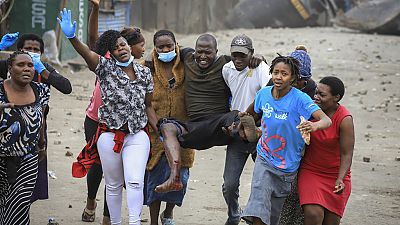

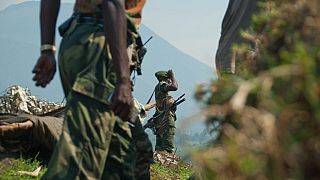
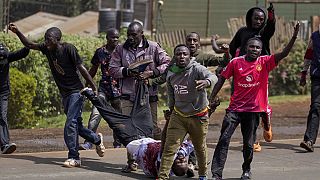
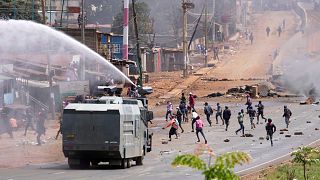
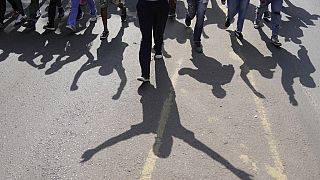


01:30
Top South African official accuses police minister of colluding with crime syndicates
Go to video
Museveni to run again as Uganda's ruling party picks him for 2026 election
Go to video
US deports eight men to South Sudan after legal battle
Go to video
Tanzania’s Prime Minister steps down ahead of elections
01:00
Pix of the Day: July 3, 2025
Go to video
’Black Empowerment’ law stalls Elon Musk's $113 million investment in SA